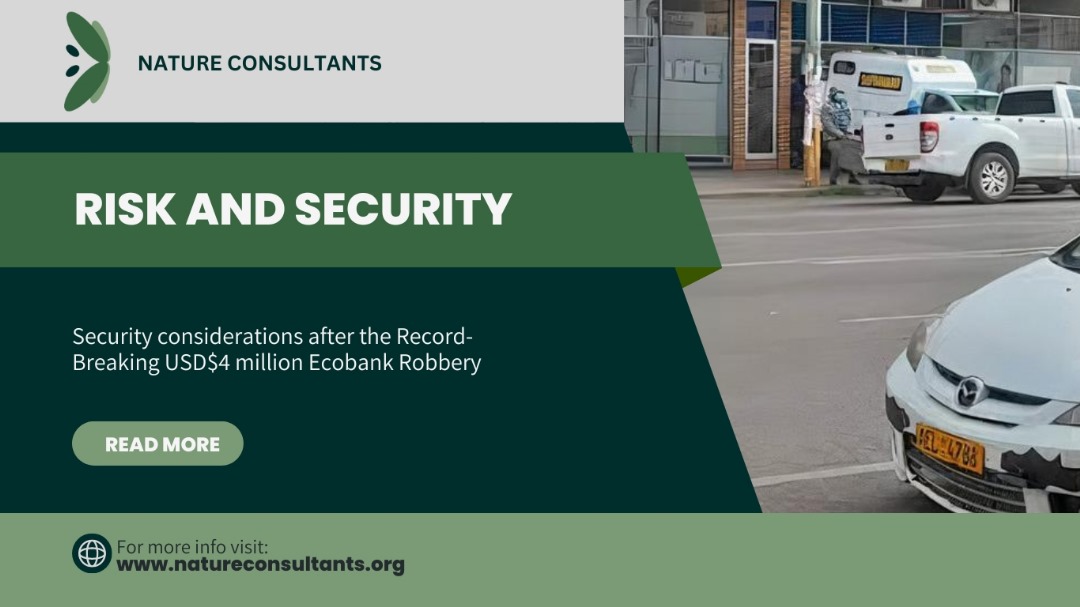Security
By Nina Alabi
Security Considerations after the Record-Breaking USD$4 million Ecobank Robbery

I am sure we are all aware of the most recent heist that took place whereby the sum of USD$4.million was stolen from a cash in transit vehicle: Robbers pounce on bank cash vehicle, get away with US$4m - The Zimbabwe Independent (newsday.co.zw). This latest incident not only brought home our exposure to the increasing crime rates in Zimbabwe but also shed light on the brazen and violent nature in which crime involving large amounts of cash can take place irrespective of the time of day.
This incident has shed light on the reality that our homes and businesses, especially those carrying out transactions with considerable amounts of cash i.e., shops, supermarkets, clinics, schools, law firms, surgeries, small businesses, car sales, estate agents, etc. are potential targets. When considering your inner circle of people, associates and partners who are privy to your business and operations there is a risk factor associated with each person in the loop. Any corrupted person in that loop who sees an opportunity for a quick payday is a doorway where this can potentially happen to you or your business. As individuals, business owners, stakeholders, and risk managers, there is an urgent need to take proactive measures to reduce our vulnerability.
Based on this, what lessons can we learn from such incidents? In my view, the first lesson step is to reduce (if not eliminate) the handling of highly sought-after cash-i.e. USD. Of course, that is easier said than done, however, the direction is to encourage and promote the use of alternative means of payments or transactions ie. cards, bank transfers etc. Of course, we all prefer the hard cash in hand, however, when we are talking about these in huge amounts, the risk is just not worth it.
Another lesson is to ensure that, as a last resort, if we have to keep cash, you set limits on the cash held on-premise. It is just too tempting to anyone, be it an outsider or insider who knows the routine and the amounts, be it a mere opportunist, a desperate disgruntled group in the organization who are willing to take the risk etc. the list goes on and on. In one of my previous write-ups, I mentioned some other useful tips on if you have to keep or transfer cash. You can read up on this.
Another area we can examine here as business owners is ensuring that we carry out ongoing risk assessments of cash transfers (including this incident) logging every tip-off, incident etc. that can be used to develop tighter and more robust controls. These assessments should also include insurance companies involved (where there is transfer of risk to a third party). That way, the third party can put in commensurate measures and make recommendations to safeguard the asset they are also assuming the risk.
Yet another point that could be of benefit is to ensure that we do not engage in anything outside of the agreed terms without prior discussions and established agreements. By this I mean, that if the terms and conditions of the transfer of cash are limited to a certain amount, any actions outside the bounds of the T&Cs should be documented highlighting the increased risk and responsibility for all parties in the process etc. It would be prudent to inform all parties involved if you intend to transfer more than the agreed limits or outside the bounds of the Terms and conditions. We should also be open and responsive to re-addressing terms and conditions to meet specific needs, changes in circumstances etc.
Always remember to review your terms and conditions and stay updated on new emerging threats, crime methodologies, vulnerable areas, and outdated procedures. It's important to be practical and regularly review your baseline security, being ready to make changes if necessary.
Don't hesitate to discuss new enhanced security measures with local security agents and organizations to ensure the safety of your staff and the assets you are responsible for.
The list above is not exhaustive, but these are important areas to focus on to avoid falling victim to crime.

